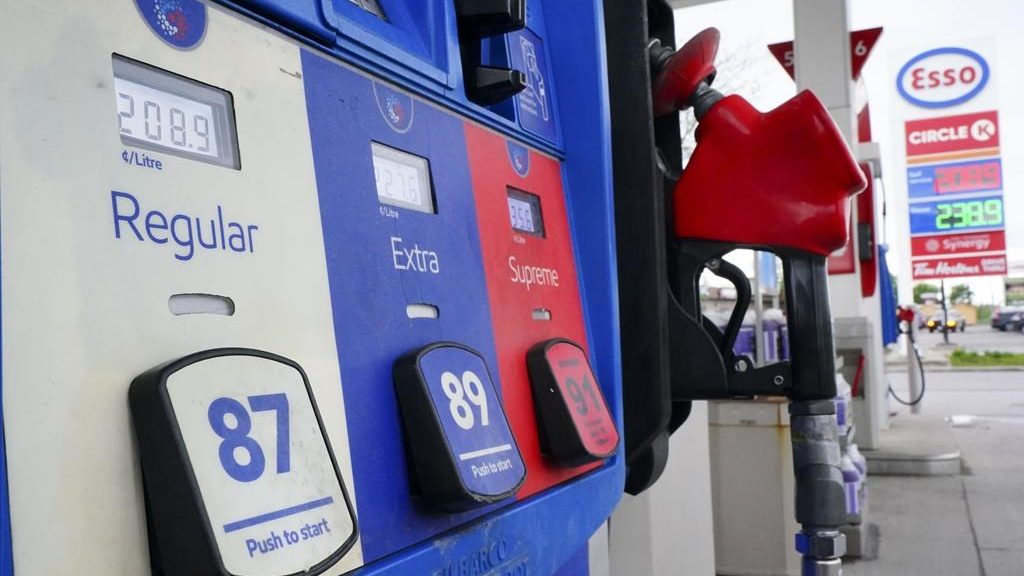Business
Nova Scotia Sees Fuel Prices Rise: Gas Up 2.4 Cents, Diesel Up 4.3 Cents

The price of fuel in Nova Scotia has experienced a modest increase, with the cost of gasoline rising by 2.4 cents per liter. According to the Nova Scotia Energy Board, the new minimum price for self-serve regular gasoline has been adjusted from 140.3 cents to 142.7 cents per liter. Meanwhile, diesel prices have also seen a notable increase of 4.3 cents, bringing the new price to 170.3 cents per liter.
This latest adjustment marks a shift in fuel costs compared to the same period last year. In 2022, consumers were paying 156.4 cents for gasoline and 173.3 cents for diesel. The increase reflects ongoing fluctuations in global oil prices and market conditions, which continue to impact consumers at the pump.
Comparative Analysis of Fuel Prices
The rise in fuel prices is significant for Nova Scotia residents, particularly in the context of rising living costs. As of now, the price hike has brought gasoline prices closer to last year’s levels, indicating a potential trend in fuel pricing as the market adjusts to external economic factors.
In recent months, the global fuel market has been subjected to various pressures, including geopolitical tensions and supply chain disruptions. These factors can lead to volatility in fuel prices, affecting local markets like Nova Scotia.
The Nova Scotia Energy Board conducts weekly assessments to ensure that fuel prices reflect current market conditions. This system aims to provide transparency and fairness to consumers, who have been grappling with fluctuating prices.
Impact on Consumers and the Economy
For residents of Nova Scotia, the increase in fuel prices can have broad implications. Higher gasoline and diesel prices can lead to increased transportation costs, affecting everything from daily commutes to the price of goods and services.
As fuel costs rise, consumers may need to adjust their budgets accordingly. Some may consider alternative transportation options or seek to reduce travel where possible. The economic ripple effects of rising fuel prices can also impact local businesses, particularly those reliant on transportation and logistics.
In conclusion, the recent adjustments in fuel prices in Nova Scotia highlight the ongoing challenges consumers face in an ever-changing economic landscape. As the market continues to evolve, residents will be closely monitoring prices at the pump, hoping for stability in the months ahead.
-

 World4 months ago
World4 months agoScientists Unearth Ancient Antarctic Ice to Unlock Climate Secrets
-

 Entertainment4 months ago
Entertainment4 months agoTrump and McCormick to Announce $70 Billion Energy Investments
-

 Lifestyle4 months ago
Lifestyle4 months agoTransLink Launches Food Truck Program to Boost Revenue in Vancouver
-

 Science4 months ago
Science4 months agoFour Astronauts Return to Earth After International Space Station Mission
-

 Technology2 months ago
Technology2 months agoApple Notes Enhances Functionality with Markdown Support in macOS 26
-

 Politics19 hours ago
Politics19 hours agoSecwepemc First Nation Seeks Aboriginal Title Over Kamloops Area
-

 Top Stories4 weeks ago
Top Stories4 weeks agoUrgent Update: Fatal Crash on Highway 99 Claims Life of Pitt Meadows Man
-

 Sports4 months ago
Sports4 months agoSearch Underway for Missing Hunter Amid Hokkaido Bear Emergency
-

 Politics3 months ago
Politics3 months agoUkrainian Tennis Star Elina Svitolina Faces Death Threats Online
-

 Politics4 months ago
Politics4 months agoCarney Engages First Nations Leaders at Development Law Summit
-

 Technology4 months ago
Technology4 months agoFrosthaven Launches Early Access on July 31, 2025
-

 Top Stories2 weeks ago
Top Stories2 weeks agoFamily Remembers Beverley Rowbotham 25 Years After Murder





















